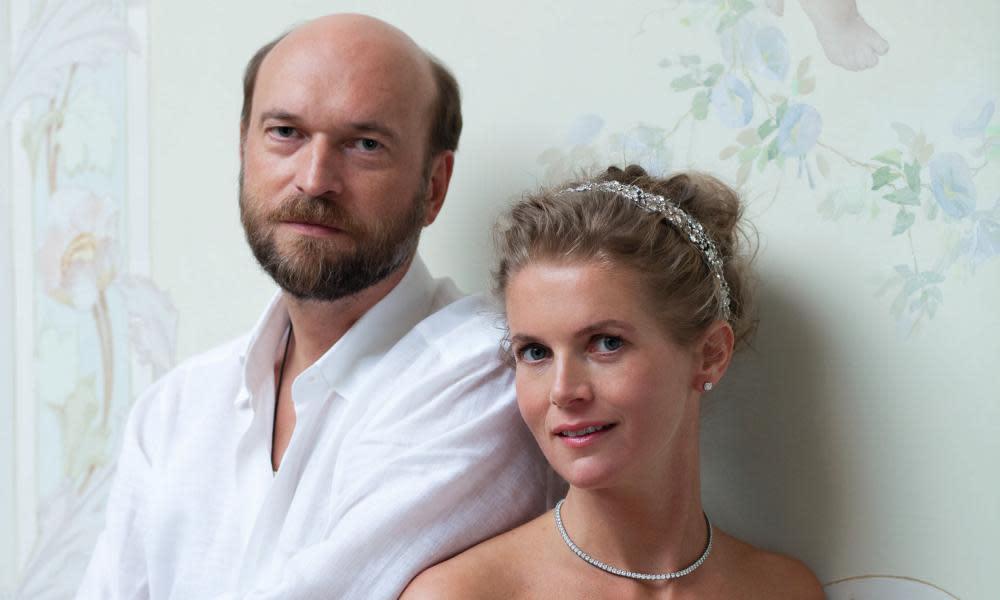The Countess and the Russian Billionaire review – a fabulously compelling nightmare

Once upon a time, children, there was a BBC Two documentary called The Countess and the Russian Billionaire. It told the story of Countess Alexandra Tolstoy, who fell in love with an oligarch called Sergei Pugachev who was very good friends with a man called Vladimir Putin until he wasn’t. If you were adults, children, you would know already how this story was likely to go. But you still would hardly believe it as it unfolded before you.
We open in 2015 with the countess – her father is a distant cousin of Leo himself – showing us round her gorgeous Chelsea home. Well, homes. They bought the equally enormous townhouse next door, too, on a whim, and knocked through, and thank goodness they did because now she, her Chanel handbag collection and Sergei have one pad, and their three children can make their mess in the other. “It’s a really fun way to live,” Alexandra explains, without moving her lips. At first I thought she had a special member of staff, on top of the nannies, driver, PA, housekeepers and French teacher to speak for her, but no – she is simply a perfect example of an English aristocrat with a trait you often see imitated and mocked but rarely in the original, whereby all movement above the neck has been bred out.
For the first few minutes, this is the most fascinating thing about the story. But then the programme begins its transformation into a fabulously compelling, soapy drama requiring of the viewer only that he or she settle yet more firmly down on the sofa and prepare to cry: “WTF!” at increasing volume and ever shorter intervals.
Sergei and Alexandra met in 2008. She was married at the time to a penniless Uzbek Cossack, whom she had met while horseriding across – well, Uzbekistan. WTF?
Sergei was a senator who had backed, funded and become a trusted adviser to Putin. The Russian leader was appalled when his ally took up with an Englishwoman, but they got together anyway and had two babies in quick succession before settling down in various homes across the globe in marital bliss. Then the wheels come off. Sergei’s bank – Sergei has a bank – goes under without repaying the Russian government the $1bn it had lent them. WTF?
Sergei flees the country to avoid being jailed and/or murdered in his homeland. The kind of visitors you don’t want to be visited by visit him and request a $350m interim payment in return for not killing him, killing his family or chopping his son’s finger off. WTF? Sergei refuses. WTF?
After that, the WTFs pile up faster than they can be humanly uttered. Sergei, already a survivor of various assassination attempts during his oligarch years, rises to No 3 on the KGB’s hitlist. The Russian state pursues him through the British courts – his passport is seized, his assets frozen worldwide – and has the family followed at all times. Sergei flees illegally to his chateau in France and decides to sue said Russian state for the loss of his business assets. “This is a high-risk strategy”, says the narrator, because narrators cannot just cry “WTF!” from the sofa.
And what do wives do when they suddenly find themselves caught up in nightmarish thriller plots that show no sign of ending tidily after 400 pages? “I’ve had periods of being terribly anxious,” notes Alexandra. You warm to her greatly.
Sergei’s true colours are revealed to us – it is never quite clear how long he has been making Alexandra forcibly aware of them – when she refuses to join him in permanent exile in France and he, she claims, “has one of his explosions” and becomes physically and emotionally abusive. She escapes with the children and never returns. From there, their story becomes that of any acrimonious divorce with issues of violence at its heart, but played out on a larger, more extravagant stage, involving international courts and denunciations on state television rather than screaming rows on the front lawn.
It’s a beautifully made piece of television and a superb demonstration of the basic truth of Ernest Hemingway’s response to F Scott Fitzgerald’s claim that “the rich are different from you and me”. “Yes,” Hemingway supposedly replied. “They’ve got more money.” And occasionally more KGB agents on their trails – but, of course, that’s the money, too.
Sergei is still awaiting the results of his lawsuit against the state. Alexandra has returned to travel agenting and horseback riding across Russia. Her mother says Sergei “brought the whole thing on himself”. And that, children, is how fairytales really end.

 Yahoo News
Yahoo News 
